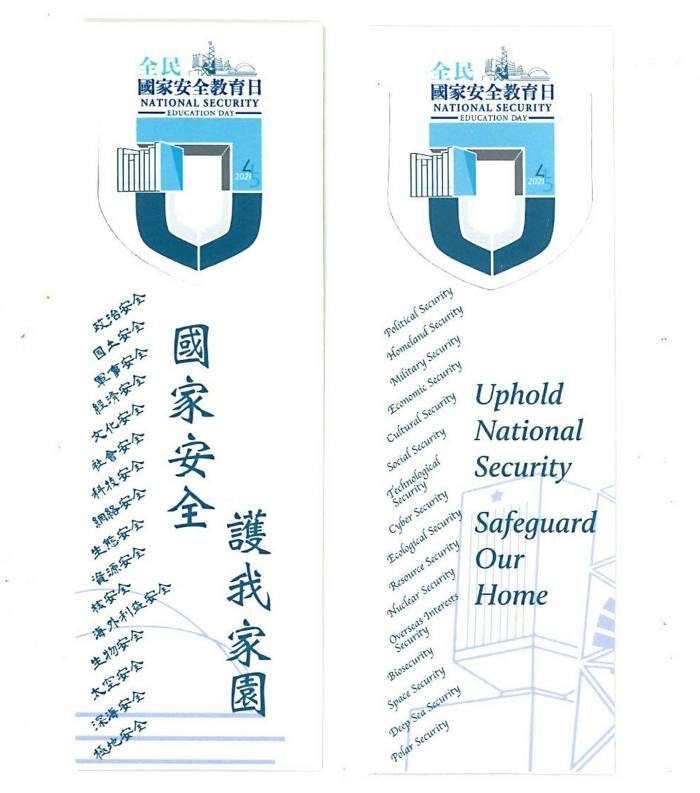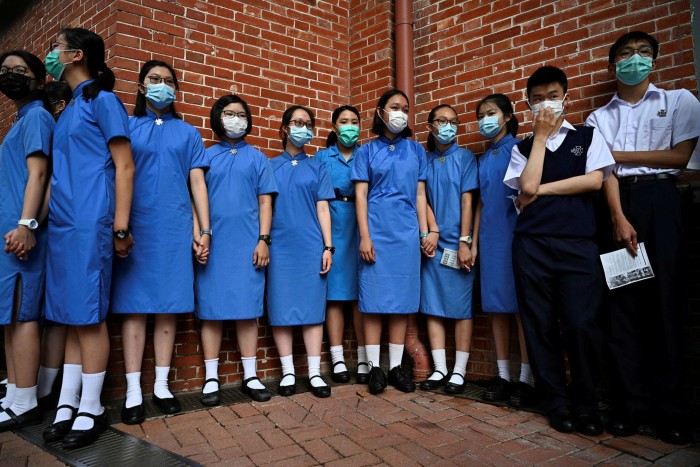[ad_1]
Diana Wong had sent letters of encouragement decorated with animal stickers to each of her class of 11 and 12-year-old students to help get them through the endless online classes of the pandemic. But a new national security curriculum that will take effect in Hong Kong from August has made the primary school teacher rethink every word she writes or image she shows the class.
Teachers are “worried that if a parent quotes us out of context or just distorts a message from a single screenshot of our class they captureâ€, their jobs, and even their freedom, could hang in the balance, she said. “It feels like there is a noose over my head.â€
Beijing imposed a sweeping national security law on Hong Kong last year in the wake of anti-government protests in 2019 that rocked the Chinese territory. The subsequent crackdown on the pro-democracy movement has crushed opposition in the city and many activists have been jailed or fled overseas.
Now, the government is extending that effort into schools with a curriculum that will force teachers to warn primary and secondary students against committing “subversion†and “foreign interference†as outlined in the national security law. International schools, which many expatriate children attend, are also affected.
The Financial Times spoke to more than a dozen teachers, parents and school administrators in Hong Kong, most of whom did not want to be identified for fear of retaliation by the government.
A national security education day on Thursday will promote the new education agenda. Families can attend open days at police and prison guard training institutes to view anti-terrorism drills and partake in virtual reality experiences. National security puzzles have been organised for kindergarten pupils.
Educators warned that the new curriculum could establish wholesale censorship, transforming classrooms for decades to come. Principals have already ordered libraries to weed out books deemed politically incorrect, and teaching materials will be vetted.
Many were already fearful before the rules were announced. Pro-Beijing politicians have campaigned against teachers they accused of opposing the government. Two educators have been struck off the register and are unlikely ever to teach again.
The city is home to 52 international schools, including the campuses of well-known British private schools such as Harrow and Malvern College.
At a briefing in February, the city’s Education Bureau assured international school staff that they would be exempt from fully integrating the national security curriculum’s requirements. But the schools will still have to tell their students about the law and ensure there are no violations on campus.
One American expatriate with two teenage children said the provisions were “really ominousâ€, though she thought the national security law was necessary to “bring peace back to Hong Kongâ€. But, she added the changes made her grateful her kids had foreign passports. “As scary as it is, when the shit hits the fan, we can go.â€
Beijing and local authorities view the Hong Kong education system as one of the culprits behind the 2019 anti-government protests, claiming that youthful protesters were led astray in the classroom. Images of uniformed secondary school students forming human chains outside their schools to support the frontline protesters set off alarms in Beijing.
“The idea of ​​rejecting the state and opposing the government has been rooted in the hearts of young people nowadays,†Hong Kong chief executive Carrie Lam said in July.
This fixation on schools is not new. In 2012, Joshua Wong and Agnes Chow — students at the time who became leaders of the pro-democracy movement and are now in jail — became the public faces of a successful campaign against a previous Hong Kong government plan to introduce a patriotic national education curriculum.
‘My home is in China’: Excerpts from new national education readers for primary and secondary students in Hong Kong
‘regional flag & emblem of Hong Kong’

‘The red flag represents the motherland and the white bauhinia represents Hong Kong. The design implies that Hong Kong is an inalienable part of China and prospers in the embrace of the motherland.‘
‘Founding Ceremony at Tiananmen’

‘The founding of the People’s Republic of China ushered in a new era in Chinese history. China has ended the humiliating history of being invaded and forced into labour for more than 100 years. It has truly become an independent country.’
After the latest protests, authorities targeted a subject called liberal studies, in which students were taught about current affairs, the legal system and in some cases, the 1989 Tiananmen Square crackdown, a student-led demonstration in Beijing that was violently suppressed. The massacre is not typically taught in mainland China.
The course has been replaced by a programme called Citizenship and Social Development, which will focus on instilling civic values in line with Beijing’s agenda and will include study tours to the mainland.
Guidelines released by Hong Kong’s education authorities this year outlined how national security should be integrated into a range of subjects from geography to biology. The government has produced videos, stickers and other materials featuring a cartoon owl to instruct young children on the national security law.
Further excerpts from ‘My Home is in China’ school readers
-
On commerce: ‘It would be cheaper to import goods from the Belt and Road countries. The quality and variety will be better.’
-
On education: ‘There is no need to focus on Europe or the US, there are a lot of good schools on the Belt and Road. There are more choices for studying abroad.’
-
On travel: ‘Chinese passports are now going to be awesome. It will be more convenient to go to the countries along the Belt and Road.’
-
On culture: ‘Getting bored of Hollywood and Disney movies or animations? Wonderful movieSchoolchildren wearing protective masks in Hong Kong
Schoolchildren wearing protective masks in Hong Kong © Roy Liu/Bloomberg -
s from the Belt and Road are available.’
One primary school principal said they had asked librarians to check all books in the school that mentioned China in case one could be interpreted the wrong way. Secondary schools would now be wary of having books on Tiananmen, for example, she said.
A number of school leaders have asked whether the Education Bureau had a list of banned books but officials said it was up to teachers’ judgment, according to the principal. “We decided to just strictly follow the textbooks in the future, as they are all vetted by the Education Bureau,†she said. “I am pretty confused.â€
A school administrator who identified herself as Ms Choi said the bureau had asked her to supply information on teachers’ criminal records and for a register of newly hired staff. The government was trying to guarantee “nobody with any political ideas would ever enter a school campusâ€, she said.
At international schools, one school board member had the impression the bureau was set to take a more lenient, “light touch†approach. The schools’ role in educating the children of bankers and executives was “too important†to the city’s role as a financial centre in the eyes of the authorities, the person added.
International schools were warned, however, to prevent “major incidentsâ€, such as students chanting anti-government slogans, the board member said. Kevin Yeung, Hong Kong’s education secretary, has said schools that fail to report activities deemed in contravention of the security law could be investigated.
Not all parents were worried by “a little Xi Jinping thought†in schools. One parent of young children said they were not surprised education in a Chinese territory would be patriotic.
A Hong Kong-based mother of two teenagers said she had sent her children to boarding school in the UK, primarily because of the pandemic. However, she was also concerned that, despite the government’s assurances to international schools, teachers would be wary of discussing sensitive topics, which would erode the quality of education. “Without clarity . . . schools will err on the side of caution,†she said.
Even before the new curriculum was introduced, some international schools had come under scrutiny from pro-Beijing activists. The American International School was attacked by a pro-Beijing newspaper in August for allegedly using a map of China that did not show Taiwan and the South China Sea as Chinese territory in a Mandarin language class.
The newspaper reported that the video that contained the map eventually disappeared from the lesson.
The school did not respond to a request for comment.
For some parents who disagreed with the government line, leaving Hong Kong has become an increasingly serious possibility. “This year the school may say that they won’t follow [the security curriculum],†said Lai, an accountant with two children at an international school. “But what about next year?â€
[ad_2]
Source link












